- Home
- Sharon Kendrick
The Final Seduction Page 2
The Final Seduction Read online
Page 2
But they had hardly spoken—other than Shelley thanking him for coming, and him stiltedly saying that she knew how much he’d loved her mother. Which was true. And he had looked ill at ease. Not surprisingly. As if he had been dying to say something not very nice to her, but hadn’t been able to as a mark of respect.
Ever unconventional, he had sent a big bunch of tiny pale mauve Michaelmas daisies, with their yellow centres glowing like miniature suns. Her mother’s favourite flower. And when Shelley had seen those she hadn’t been able to stop crying…
Now her heart drummed with the vibrant reality of seeing him again. It had been a long time—in fact it gave her a real jerk when she realised just how long it had been.
She stared at him.
A couple of the lines on his face weren’t quite as faint as before. And the eyes had lines at the corners which had not been there before, either. Crinkly little laughter lines, which made Shelley wonder who had put them there. The hair was still thick, still ruffled—all dark and windswept with the ends lightened to honey by the sun.
He was taller than Marco—taller than nearly all the men she had ever met, and most of that seemed to be leg. His faded denims matched the sky, while the navy sweater matched his eyes.
Her first, instinctive thought was that she must have been mad to ever leave him. But that wasn’t a very smart thing to think. You shouldn’t wish for the impossible, and you couldn’t rewrite history. And the unfriendly look in his eyes told her that he certainly wouldn’t want to—even if you could.
‘Hello, Drew,’ she said at last, and with that he let her go. She half stumbled and she saw him tense as if to save her if she fell again. But she didn’t. Just tottered for a moment on the too high heels of her leather boots. She smiled up at him, as anyone would in the face of such courtesy. ‘Thank you for coming to my rescue.’
He didn’t bother with any niceties. And he didn’t smile back. ‘Don’t make me out to be Sir Galahad,’ he drawled. ‘He shouldn’t have knocked you over. He knows he’s not to jump up at people like that.’
‘It was my fault.’ She looked over at the dog and realised her mistake. The animal was paler and thinner and much younger than the dog she remembered. ‘It isn’t Fletcher?’
‘How could it be?’ he asked impatiently. ‘Fletcher was almost crippled when you left—not jumping around like a puppy. I know they say that the Milmouth air is rejuvenating but that would be a little short of miraculous!’
‘Still, I shouldn’t have called him like that.’
‘No, you shouldn’t,’ he agreed shortly.
‘He’s lovely, Drew,’ she said, meaning it. ‘When did you get him?’
‘He isn’t mine.’ His eyes were wintry. ‘I’m just walking him for somebody else.’
‘Anybody I know?’ The question came out before she realised that she had no right to ask him things like that.
He clearly thought so, too. ‘What would you say if I told you I was out walking him for a sweet, little old lady?’
The trouble was that she would believe him. ‘I’d say that you were a model citizen. An upstanding member of the community.’
‘Would you?’ he queried softly, and let his gaze drift unhurriedly over her face. ‘Would you really?’
Shelley shifted. She was used to men staring. That was what men did in Italy. It was acknowledged and recognised as perfectly normal to gaze at a woman in open appreciation, as you would a fine painting, or a delicious meal. But the way Drew was looking at her was making her feel uncomfortable. As if she were some bit of flotsam he had found washed up on the beach.
And he was shaking his head, as though he didn’t like what he saw. ‘What on earth have you done to yourself?’ he demanded in a low, incredulous voice.
He made her feel like Cinderella before the transformation scene. ‘Done to myself?’ Her indignation was genuine. ‘What’s that supposed to mean?’
He shrugged. ‘Well, the dog wouldn’t have knocked you over if you hadn’t been so damned skinny.’
‘Skinny?’ she gritted. The word was insulting—as he had obviously meant it to be. ‘Don’t you know anything, Drew? That a woman can never be too thin—’
‘What a load of rubbish,’ he interrupted with quiet, curling distaste. ‘Haven’t you heard that the waif look is out? You look like you haven’t eaten a square meal in years.’
Should she bother telling him that women in Milan watched their figures like hawks? Which was why they looked beautiful and elegant in the wonderful fashions which the city was so famous for. ‘Clothes look much better if you aren’t carrying any excess flesh,’ she told him smugly. ‘Everyone knows that.’
‘Well, I prefer to see a woman out of clothes,’ he drawled, noticing with pleasure that she flinched when he said that. Good! He smiled as his gaze lingered in a way which was now very Italianate. ‘And when a woman is naked a few curves are infinitely preferable to looking like a bag of bones.’
‘Bag of bones?’ she repeated in horrified disbelief, feeling quite sick at the thought of him with naked women. ‘Are you saying that I look like a bag of bones?’
He shrugged. ‘Pretty much. You sure as hell don’t look great. Mind you—’ and his gaze narrowed ‘—the clothes don’t help—and what on earth have you done to your hair?’
Shelley could hardly believe what she was hearing! She had learnt a lot about looking good while she had been living with Marco. From a rather wild and windswept girl, she had become high-maintenance woman. She had transformed herself from small-town hick to city slicker. People admired the way she looked these days—her hips were as narrow as a boy’s and she only ever wore neutrals.
But Drew didn’t seem to be one little bit impressed by her new-found fashion know-how.
She glanced down at her admittedly rather crumpled grey linen suit—and then back up into a pair of judgemental navy eyes.
‘I agree that this isn’t what I would normally wear to walk on the beach,’ she allowed. ‘But this suit was designed by one of Milan’s most desirable couturiers.’ She saw him pull a face, and as the events of the last days took their toll something inside her snapped.
‘Most women would give their eye-teeth to own an outfit by this designer!’ she fumed. ‘And as for my hair! For your information, it is shaped and tinted with highlights and lowlights every six weeks, by one of Milan’s finest cutters. Have you,’ she heard herself asking inanely, ‘any idea of how much it costs to look like this?’
But as soon as the words were out and she saw the look on his face she wished she could unsay them.
Distaste wasn’t the word.
‘I should have guessed that money would have been at the top of your agenda! So no change there.’ He gave a scornful little laugh. ‘Well, for your information, kitten—you were done.’
‘Done?’
‘Yeah, done. Conned. Fleeced. Cheated.’
Shelley couldn’t believe her ears. ‘What?’
‘You heard,’ he whispered softly. ‘You’ve become one of those women who know the cost of everything and the value of nothing, haven’t you, Shelley? Seems like I had a lucky escape.’
‘Or maybe you just don’t like the way I dress because the clothes I wear indicate that I’m an independent woman now?’
‘Independent?’ His lips curled like an old-fashioned movie star’s. ‘I don’t think so! Being a rich man’s plaything doesn’t usually fall into the category of independent.’
She didn’t have to defend herself to him, so why did she suddenly feel as though she was in the witness box?
She chipped the words out like ice. ‘I virtually ran the art gallery in Milan, for your information!’
‘What? Flat on your back?’
Shelley opened her mouth to snap back at him, but no words came. This wasn’t how it was supposed to be. She had imagined seeing Drew again one day; of course she had. Every woman thought of the man they had almost married from time to time. And she had had lots of imaginary conversations with him
inside her head. But they had been nothing like this. Rather, some of them had gone along the lines of him narrowing his eyes in appreciation and giving a long, low whistle while a look of profound regret would give his body a kind of deflated look, before he said something like, ‘Wow!’
Others had been stupidly unrealistic versions involving white lace and rice and confetti, but she had banished those very early on. They used to make her pillow damp with tears.
But not this. She met the mockery in his eyes.
‘Actually,’ she said, with acid-sweetness, ‘while you’ve been busily hammering nails into pieces of wood, I’ve learnt to speak fluent Italian, as well as how to—’ She looked pointedly at where the denim was at its thinnest, stretched tautly over his mouthwatering thighs. She swallowed. ‘Dress.’
‘Just not very attractively,’ he amended silkily. ‘Shelley, your arrogance is simply breathtaking.’
‘Then it’s a good match for yours, isn’t it, Drew?’
‘So where is he?’
She played dumb. ‘Who?’
‘Your lover, your mentor, your stallion—’
‘Please don’t call him that!’
‘Why not? Does the truth offend you?’ He looked around the empty beach with exaggerated scrutiny. ‘I expect he’s somewhere warm and comfortable, is he, polishing the leather of his hand-made shoes?’
‘Why, you…you…Philistine!’ Her eyes swivelled to his feet. He wore a scruffy old pair of canvas deck-shoes, without socks. Without socks! Marco would have sooner gone to prison than gone out in footwear like that! He would have said that those were shoes for a tramp. And yet somehow Drew managed to look nothing like a tramp. He looked, Shelley realised with a lurch of horror, he looked incredibly sexy…
‘You look like you should be standing on a street corner begging for small change!’ She glared at him.
His body tensed, as though he was fighting some dark, internal demon, and then he shook his head slightly. ‘I guess we’ve traded all the insults we need to. Why don’t you tell me how long you’re here for, Shelley? Just passing through? Or have you come to put your mother’s old house on the market?’
She didn’t stop to think, but then maybe she didn’t need to. Maybe she had known all along just what her answer to this would be. ‘Why would I be passing through? Milmouth doesn’t take you anywhere. No, I’ve come home, Drew,’ she told him, observing his frozen reaction more with pain than with pleasure. ‘Home to stay.’
The screech of a gull could be heard over the whining wind and the relentless smack of the waves hitting the beach.
‘You’re staying?’ He narrowed his eyes. ‘For how long?’
‘I haven’t decided—and if I had I wouldn’t be telling you! My plans are flexible.’
He considered this. ‘And where exactly will you be staying, Shelley?’
‘At my mother’s house, of course. Where else?’ She glared at him again. ‘Sorry. Have I said something funny?’
He shook his head, still laughing. ‘Ironic more than funny.’
‘That’s a little too subtle for me, Drew. Care to let me in on the joke?’
He shrugged, and Shelley’s eyes were irresistibly drawn to the hard, strong body moving beneath the thick knit. ‘Just that I can’t imagine your rich lover gearing up for a night of passion in your mother’s old house. Apart from the limitations imposed by the room sizes—the walls are paper-thin!’
‘That’s not only coarse, it’s also inaccurate. Marco has never been a snob!’
‘No? Well, then it must be you who has the image problem, mustn’t it, Shelley? Because you never brought him back to Milmouth, did you? Not once!’ he accused. ‘Not even—’ and he drew a deep breath ‘—to your mother’s funeral!’
Should she tell him that it hadn’t seemed right to do so? That her mother had hated Marco nearly as much as she had adored Drew? It would have seemed disrespectful to her mother’s memory to bring along the man she had never stopped blaming for the disintegration of her dreams.
For in Veronica Turner’s mind Shelley and Drew would still have been engaged if Marco had not happened along. For a long time Shelley would have agreed with her, but now she recognised that Marco had probably done her a big favour.
Shelley herself had been sick with grief and regret. In fact she had barely been able to function. But apparently that was the normal reaction to sudden death. It had seemed the easier option to handle things on her own. To avoid situations which might create ugly scenes…
‘Oh, what’s the point in trying to explain?’ she questioned tiredly. ‘You’ll only believe what you want to believe. And I know how much you hate me, Drew.’
‘Hate you?’ He looked at first surprised and then very slightly perplexed, as if she were being hysterical. ‘Hating you would imply that you have some significance in my life, Shelley. And you don’t. None at all. Not any more. Duke!’ The dog came loping over. ‘Come on, time to go.’
And he strode off without a word, or even a glance of farewell. Just like that.
She watched him walking away from her across the pebbles and a great tidal wave of sadness rocked her, overwhelming her with its force. Because she had lost everything that once existed between her and Drew, and that was the brutal reality.
The water on the western side of the shore was a deeper shade of blue than the washed-out sky and in his navy sweater and faded jeans Drew seemed to blur and blend into the landscape itself. Shelley watched him and felt a sudden wrench as she remembered the way he had been able to make her laugh.
Remembered the way he had always looked at her—as though someone had just given him a wonderful present. Compare that, she thought, as she swallowed back the memories, with the icy disapproval she had seen on his face just now.
They had been friends, she realised—really good friends. And she had thrown it all away. With one irrevocable gesture she had sacrificed that friendship and everything that went with it.
She had made her choices willingly—no one had held a gun to her head. But the reality of what those choices had done to her life invaded Shelley’s memory like a dark, stormy cloud.
CHAPTER THREE
SHELLEY had known Drew Glover for as long as she remembered, and she must have known him before that as well.
They had grown up next door to each other in the small, boxy houses which were clustered on the poorer side of Milmouth—a million light years away from the imposing Edwardian villas which overlooked the sea on the western side of the village. She was almost eight years younger than him, and the same age as his youngest sister, Jennie.
Shelley had been brought to Milmouth as a baby, an unsettled, grizzly child whose nature had been forged by uncertainty and insecurity. According to her mother, Drew would bend and pick up the toys she hurled out of her pram and solemnly hand them back to her. But then he had two younger sisters of his own.
‘He was such a sweet-natured boy,’ Veronica Turner had told her daughter with a beaming smile, the day Shelley and Drew decided to get married. ‘And he still is.’
Shelley remembered his curiosity. His protectiveness. He had been the first person who had ever stood up for her—when he overheard one of the other children taunting her.
‘So why haven’t you got a father, Shelley Turner?’
She had been about seven at the time, an age when she’d desperately wanted to be like everyone else. And Milmouth was so small and provincial. Everyone else had two parents.
Her face had started working and her mouth had wobbled and she didn’t know what she would have answered when Drew had appeared from out of nowhere—tall and tough and teenaged—and had announced scornfully, ‘Of course she’s got a father! Everyone’s got a father—hers just doesn’t live with her, that’s all.’
‘Where does he live, then?’ one of the others had been bold enough to ask.
Even now Shelley remembered looking into Drew’s eyes—so deep and blue and encouraging—and knowing that she should never
be ashamed of the truth. If only she had remembered that…‘He lives in America,’ she’d told the child steadily. ‘He’s a dentist.’
These two impressive facts had kept the other children quiet for a while, but Shelley had remained an outsider. Veronica Turner had taught her daughter to keep her head down and not make waves. Not to invite people back to the house unless she was really certain that she liked them, and, more importantly, that they liked her. It was better to be considered cold than to risk rejection.
But then, Shelley’s mother had known all about rejection. It was a force that had shaped her whole life—a dark, shameful secret she’d kept hidden away. Only Drew knew the full story and Shelley still remembered the day she had told him.
She had been counting cars, sitting on a low wall which separated their little group of houses from the big main road which brought all the holiday-makers into Milmouth during the summer months.
A red car had whizzed by and Shelley had stuck her tongue out between her lips and wrote it down in her notebook.
Drew had been on his way home from the boatyard, where he worked after school, drinking from a can of cola. He’d peered over her shoulder as he passed, then paused.
‘What are you doing?’
Shelley shrugged. ‘Counting cars.’
He grinned. ‘Oh? Make a habit of that, do you?’
‘It’s for my maths,’ she explained. ‘Averages and probability.’
He pulled a face and came to perch beside her. ‘Who’s winning?’
‘Blue,’ she said. ‘I’ve counted eleven, so far.’
‘Oh.’ He offered her the can. ‘Fancy a slug?’
Shelley shook her head. Money was tight in the Turner household. Never take what you can’t repay—her mother had drummed that in to her time and time again. ‘No, thanks.’
He stared at her serious little profile. ‘Why do you never see your father?’ he asked suddenly.
Shelley shrugged. If it had been anyone other than Drew who had asked it, she might have told them to mind their own business. But Drew was Drew.
‘I saw him once,’ she explained. ‘When I was a baby.’

 The Sheikh's Royal Announcement
The Sheikh's Royal Announcement The Mediterranean Prince's Passion (The Royal House 0f Cacciatore Book 1)
The Mediterranean Prince's Passion (The Royal House 0f Cacciatore Book 1) Bought Bride For The Argentinian (Conveniently Wed!)
Bought Bride For The Argentinian (Conveniently Wed!) Secrets of Cinderella's Awakening
Secrets of Cinderella's Awakening His Contract Christmas Bride
His Contract Christmas Bride One Night Before The Royal Wedding (Mills & Boon Modern)
One Night Before The Royal Wedding (Mills & Boon Modern) Cinderella's Christmas Secret (Mills & Boon Modern)
Cinderella's Christmas Secret (Mills & Boon Modern) Cinderella In The Sicilian's World (HQR Presents)
Cinderella In The Sicilian's World (HQR Presents) The Argentinian's Baby Of Scandal
The Argentinian's Baby Of Scandal The Argentinian's Baby 0f Scandall (One Night With Consequences)
The Argentinian's Baby 0f Scandall (One Night With Consequences) Kat And The Dare-Devil Spaniard (The Balfour Brides Book 2)
Kat And The Dare-Devil Spaniard (The Balfour Brides Book 2) The Prince's Love-Child (The Royal House 0f Cacciatore Book 2)
The Prince's Love-Child (The Royal House 0f Cacciatore Book 2) His Contract Christmas Bride (Conveniently Wed!)
His Contract Christmas Bride (Conveniently Wed!) Shamed in the Sands
Shamed in the Sands The Sheikh’s Secret Baby
The Sheikh’s Secret Baby The Pregnant Kavakos Bride
The Pregnant Kavakos Bride The Italian's Love-Child
The Italian's Love-Child Defiant in the Desert
Defiant in the Desert Desert Jewels & Rising Stars
Desert Jewels & Rising Stars Crowned for the Prince's Heir
Crowned for the Prince's Heir Constantine's Defiant Mistress
Constantine's Defiant Mistress Sexy Sheikh Bundle (Harlequin Presents)
Sexy Sheikh Bundle (Harlequin Presents) Kiss and Tell
Kiss and Tell Crowned for the Sheikh's Baby
Crowned for the Sheikh's Baby The Greek Tycoon's Baby Bargain
The Greek Tycoon's Baby Bargain The Forbidden Innocent
The Forbidden Innocent The Final Seduction
The Final Seduction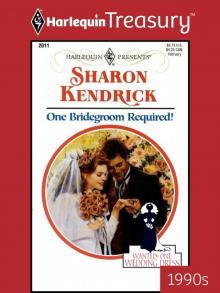 One Bridegroom Required!
One Bridegroom Required! One Wedding Required!
One Wedding Required! The Sheikh's English Bride
The Sheikh's English Bride Exposed The Sheikh’s Mistress
Exposed The Sheikh’s Mistress A Royal Vow of Convenience
A Royal Vow of Convenience The Sheikh's Christmas Conquest
The Sheikh's Christmas Conquest The Housekeeper's Awakening
The Housekeeper's Awakening His Majesty's Child
His Majesty's Child The Greek's Marriage Bargain
The Greek's Marriage Bargain The Italian Billionaire's Secretary Mistress
The Italian Billionaire's Secretary Mistress Shameful Secret, Shotgun Wedding
Shameful Secret, Shotgun Wedding The Forbidden Wife
The Forbidden Wife Desert Princes Bundle
Desert Princes Bundle Bedded for revenge
Bedded for revenge The Prince's Chambermaid
The Prince's Chambermaid The Italian's Christmas Housekeeper
The Italian's Christmas Housekeeper The Sheikh’s Heir
The Sheikh’s Heir The Desert Prince's Mistress
The Desert Prince's Mistress A Whisper of Disgrace
A Whisper of Disgrace Surrender to the Sheikh (London's Most Eligible Playboys Book 2)
Surrender to the Sheikh (London's Most Eligible Playboys Book 2) Carrying the Greek's Heir
Carrying the Greek's Heir Christmas in Da Conti's Bed
Christmas in Da Conti's Bed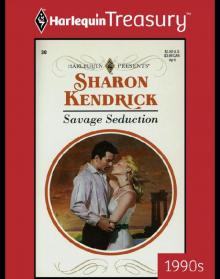 Savage Seduction
Savage Seduction A Scandal, a Secret, a BabyMarriage Scandal, Showbiz Baby!
A Scandal, a Secret, a BabyMarriage Scandal, Showbiz Baby! The Future King's Bride
The Future King's Bride Society Weddings
Society Weddings The Unlikely Mistress
The Unlikely Mistress Finn's Pregnant Bride
Finn's Pregnant Bride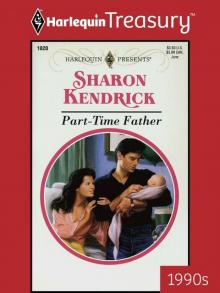 Part-Time Father (Harlequin Presents)
Part-Time Father (Harlequin Presents) The Sheikh's Undoing
The Sheikh's Undoing The Unlikely Mistress (London's Most Eligible Playboys #01)
The Unlikely Mistress (London's Most Eligible Playboys #01)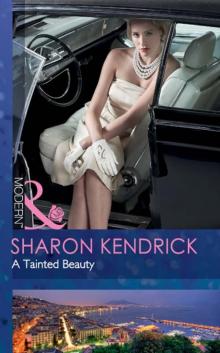 A Tainted Beauty
A Tainted Beauty Surrender to the Sheikh
Surrender to the Sheikh The Royal Baby Revelation
The Royal Baby Revelation The Greek's Bought Bride
The Greek's Bought Bride The Sicilian's Passion
The Sicilian's Passion Happy Mother's Day!
Happy Mother's Day! Di Sione's Virgin Mistress
Di Sione's Virgin Mistress The Italian's Christmas Secret
The Italian's Christmas Secret Secrets of a Billionaire's Mistress (Mills & Boon Modern) (One Night With Consequences, Book 29)
Secrets of a Billionaire's Mistress (Mills & Boon Modern) (One Night With Consequences, Book 29) The Sheikh's Bought Wife
The Sheikh's Bought Wife The Billionaire's Defiant Acquisition
The Billionaire's Defiant Acquisition Seduced by the Sultan
Seduced by the Sultan Playing the Greek's Game
Playing the Greek's Game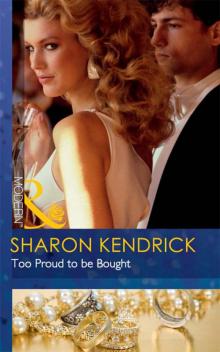 Too Proud to be Bought
Too Proud to be Bought Back in the Headlines
Back in the Headlines Bound to the Sicilian's Bed
Bound to the Sicilian's Bed One Husband Required!
One Husband Required!